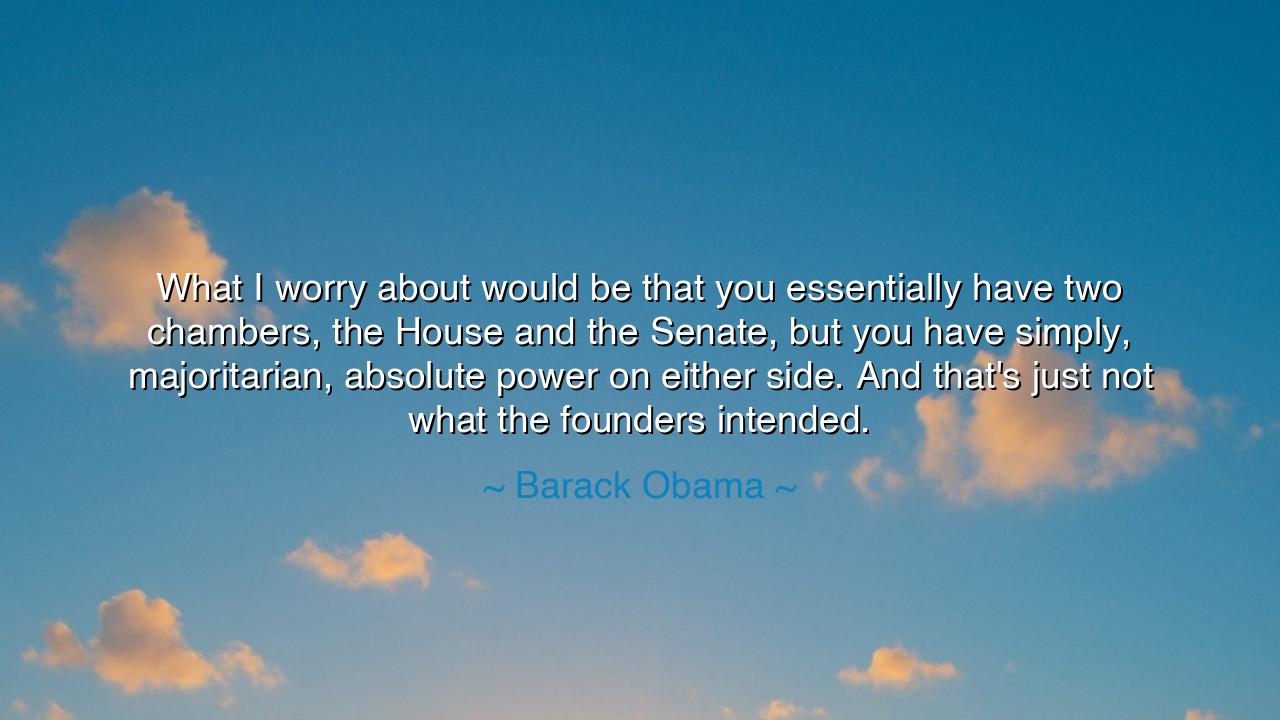
What I worry about would be that you essentially have two
What I worry about would be that you essentially have two chambers, the House and the Senate, but you have simply, majoritarian, absolute power on either side. And that's just not what the founders intended.






In a time of growing division, when the thunder of partisanship echoed through the halls of power, Barack Obama, a man both scholar and statesman, spoke with the calm authority of one who understood the ancient architecture of freedom. He said: “What I worry about would be that you essentially have two chambers, the House and the Senate, but you have simply, majoritarian, absolute power on either side. And that's just not what the founders intended.” His words were neither lament nor accusation — they were a call to memory, a reminder of the fragile balance upon which the Republic was built. For Obama knew that when passion overrules principle, when numbers alone dictate justice, the house of democracy begins to tremble.
The origin of this quote lies in the deep philosophical struggle between unity and division that has marked the American experiment since its birth. Obama spoke these words in 2010, amid fierce partisan battles in Congress. The debates over legislation, nominations, and governance had become less about ideas and more about dominance — about winning, not serving. His warning echoed the wisdom of the Founding Fathers, who feared the tyranny of both kings and crowds alike. They built the nation’s government not upon the rule of the majority alone, but upon the delicate dance of checks and balances, where power is distributed, debated, and restrained, lest it consume itself in the fire of human ambition.
When Obama spoke of his fear of “majoritarian, absolute power,” he invoked the very spirit of James Madison, the father of the Constitution. Madison, in The Federalist Papers, wrote that the accumulation of all power in the same hands — whether of one, few, or many — is the very definition of tyranny. He and the other framers designed the House and Senate not as rivals, but as mirrors of temperance: one to reflect the will of the people, the other to guard against their sudden passions. In this way, law would be born not of haste but of harmony. Obama’s concern was that this sacred equilibrium had begun to falter, replaced by the relentless pursuit of victory at all costs — the death of compromise and the rise of faction.
History, too, bears witness to the wisdom of his warning. In ancient Athens, where democracy first blossomed, the people’s assembly held near-total power. At first, it seemed glorious — the rule of all citizens, free and equal. But without restraint, the majority turned against its own thinkers and generals, condemning Socrates to death and exiling heroes like Aristides, the Just. The very democracy that promised freedom descended into chaos, and from that chaos arose tyranny. The lesson of Athens was written anew in Rome, where once the Senate — a chamber of wisdom and restraint — gave way to the voices of demagogues, until the republic itself perished. Obama, schooled in history’s lessons, knew that even the mightiest republics fall when majority becomes mob, and passion replaces prudence.
Yet his message was not born of despair. Rather, it was a plea for balance, for the restoration of the civic virtue upon which democracy depends. He did not condemn disagreement — for disagreement is the lifeblood of liberty — but he warned that when one side seeks absolute control, the purpose of governance is lost. Government, he reminded us, is not a battlefield for conquest but a covenant of cooperation. The founders intended for the chambers of Congress to deliberate, not to dominate; to reflect the people’s will, not to weaponize it. The danger of unchecked majoritarianism is that it silences minority voices, erases dissent, and turns representation into rule — the very tyranny the founders rebelled against.
Obama’s words carry a quiet moral gravity: that power must be shared if freedom is to survive. True strength in a republic is not found in one party’s triumph, but in the willingness of opposing forces to labor together for the common good. Compromise is not weakness; it is wisdom. The founders, wise in their suspicion of human nature, understood that ambition must be made to counteract ambition — that no man, no faction, no chamber should ever hold absolute sway. Their design was not meant to make governing easy, but to keep it honest.
The lesson, then, is timeless. Democracy is not a machine that runs itself; it is a living covenant, renewed only through humility and restraint. When citizens and leaders alike remember that the Republic belongs to all, not just to those who hold the majority, then the nation stands firm. But when the lust for dominance replaces the love of justice, the sacred balance collapses, and liberty withers. The founders’ wisdom — and Obama’s echo of it — teaches us this eternal truth: that freedom survives only where power is shared, where debate remains civil, and where every voice, even the smallest, is heard.
So let the words of Barack Obama stand as a warning and a guide: “That’s just not what the founders intended.” Guard against the arrogance of majority and the despair of minority. Cherish the slow, imperfect labor of consensus. For though it is easier to conquer than to cooperate, it is only through cooperation that a free people endure. And in that enduring harmony — between law and liberty, between power and principle — lies the immortal heartbeat of the Republic itself.






AAdministratorAdministrator
Welcome, honored guests. Please leave a comment, we will respond soon